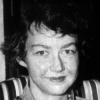Flannery O'Connor

Flannery O'Connor
Mary Flannery O'Connorwas an American writer and essayist. An important voice in American literature, she wrote two novels and 32 short stories, as well as a number of reviews and commentaries. She was a Southern writer who often wrote in a Southern Gothic style and relied heavily on regional settings and grotesque characters. Her writing also reflected her own Roman Catholic faith and frequently examined questions of morality and ethics. Her posthumously-compiled Complete Stories won the 1972 U.S. National Book...
NationalityAmerican
ProfessionNovelist
Date of Birth25 March 1925
CitySavannah, GA
CountryUnited States of America
Where there is no belief in the soul, there is very little drama . . . . Either one is serious about salvation or one is not. And it is well to realize that the maximum amount of seriousness admits the maximum amount of comedy. Only if we are secure in our beliefs can we see the comical side of the universe.
... the man in the violent situation reveals those qualities least dispensable in his personality, those qualities which are all he will have to take into eternity with him.
Success means being heard and don't stand there and tell me that you are indifferent to being heard. You may write for the joy of it, but the act of writing is not complete in itself. It has to end in its audience.
You ought to be able to discover something from your stories. If you don't, probably nobody else will.
Policy and politics generally go contrary to principle.
If we forget our past, we won't remember our future and it will be as well because we won't have one.
The idea of being a writer attracts a good many shiftless people, those who are merely burdened with poetic feelings or afflicted with sensibility.
A story has to have muscle as well as meaning, and the meaning has to be in the muscle.
Elizabeth Hardwick told me once that all her first drafts sounded as if a chicken had written them. So do mine for the most part.
Dogma can in no way limit a limitless God.
Later he saw Jesus move from tree to tree in the back of his mind, a wild ragged figure motioning him to turn around and come off into the dark where he might be walking on the water and not know it and then suddenly know it and drown.
At its best our age is an age of searchers and discoverers, and at its worst, an age that has domesticated despair and learned to live with it happily.
It seems that the fiction writer has a revolting attachment to the poor, for even when he writes about the rich, he is more concerned with what they lack than with what they have.
The Southerner is usually tolerant of those weaknesses that proceed from innocence.